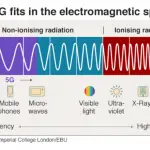Electromagnetic hypersensitivity (EMF sensitivity) refers to a condition where individuals experience various symptoms such as headaches, fatigue, and dizziness when they are exposed to electromagnetic radiation from electronic devices. There is ongoing debate among researchers and healthcare professionals about whether EMF sensitivity is a real medical condition or a psychosomatic reaction to perceived exposure. In this article, we will explore the evidence surrounding EMF sensitivity to help shed light on this controversial topic.
Understanding EMF
EMF stands for electromagnetic field, which is the force that comes from electrically charged objects. EMFs are present in our daily lives, from the electrical wiring in our homes to the wireless signals from our devices.
EMF Sensitivity
EMF sensitivity, also known as electromagnetic hypersensitivity, is a condition in which individuals experience symptoms such as headaches, fatigue, and dizziness when exposed to EMFs. There is no scientific evidence to support the existence of EMF sensitivity, and many experts believe it to be a psychosomatic condition.
Key takeaway: While EMFs are present in our daily lives, there is no scientific evidence to support the existence of EMF sensitivity or its potential negative health effects. The controversy surrounding EMF sensitivity may be linked to psychosomatic factors or the nocebo effect. Organizations such as the World Health Organization have developed guidelines to promote awareness of potential risks and limit exposure to EMFs. Myths surrounding EMFs, such as their link to cancer, disrupted sleep patterns, and fertility, are not supported by conclusive scientific evidence.
The Controversy Surrounding EMF Sensitivity
The controversy surrounding EMF sensitivity stems from the lack of scientific evidence to support its existence. While some individuals report experiencing symptoms when exposed to EMFs, studies have not been able to replicate these findings. Some experts believe that EMF sensitivity may be a result of a nocebo effect, where individuals experience symptoms because they believe they are being exposed to something harmful.
The Symptoms of EMF Sensitivity
The symptoms of EMF sensitivity can vary from individual to individual and can include:
- Headaches
- Fatigue
- Dizziness
- Nausea
- Tingling or burning sensations
- Sleep disturbances
The Science Behind EMFs
EMFs are present in our daily lives, from the electrical wiring in our homes to the wireless signals from our devices. While there is no evidence to suggest that EMFs are harmful to human health, some studies have raised concerns about their potential effects on the body.
Key Takeaway: While some individuals report experiencing symptoms when exposed to EMFs, there is no scientific evidence to support the existence of EMF sensitivity. The potential health effects of EMFs and their link to cancer and fertility issues are still inconclusive, and more research is needed to determine the long-term effects of exposure to EMFs on the human body. It is important to adhere to safety guidelines for exposure to EMFs and promote awareness of potential risks associated with high levels of exposure.
The Potential Health Effects of EMFs
Studies have linked exposure to high levels of EMFs to an increased risk of cancer and other health issues. However, the evidence is not conclusive, and more research is needed to determine the long-term effects of exposure to EMFs.
The Safety Guidelines for EMFs
To ensure the safety of individuals, organizations such as the World Health Organization have developed guidelines for exposure to EMFs. These guidelines recommend limiting exposure to EMFs and promoting awareness of the potential risks associated with high levels of exposure.
The Myths Surrounding EMFs
There are many myths surrounding EMFs, from the idea that they can cause cancer to the belief that they can disrupt sleep patterns. While there is some evidence to suggest that exposure to high levels of EMFs can have negative effects on the body, many of these myths are not supported by scientific evidence.
The Myth of EMFs and Cancer
While some studies have linked exposure to high levels of EMFs to an increased risk of cancer, the evidence is not conclusive. Many experts believe that the potential risks associated with exposure to EMFs are low, and that there is no need for individuals to be overly concerned about their exposure to EMFs.
The Myth of EMFs and Sleep
There is some evidence to suggest that exposure to high levels of EMFs can disrupt sleep patterns. However, many of the studies that have explored this topic are inconclusive, and more research is needed to determine the long-term effects of exposure to EMFs on sleep patterns.
The Myth of EMFs and Fertility
There is some concern that exposure to high levels of EMFs can have negative effects on fertility. However, the evidence is limited, and more research is needed to determine the potential risks associated with exposure to EMFs on fertility.
FAQs for Is EMF Sensitivity Real
What is EMF sensitivity?
EMF sensitivity, also known as electromagnetic hypersensitivity (EHS), is a condition in which an individual experiences various symptoms such as headaches, fatigue, and anxiety when exposed to electromagnetic fields (EMFs). EMFs are generated by various electronic devices such as smartphones, Wi-Fi routers, and power lines.
Is EMF sensitivity a real condition?
The medical community remains divided on the existence of EMF sensitivity as a standalone medical condition. Some medical professionals believe that EMF sensitivity is a real condition, while others dismiss it as a psychosomatic disorder. Existing scientific research does not offer a clear consensus on the issue, and more research is needed to determine the true nature of this condition.
What are the symptoms of EMF sensitivity?
The symptoms of EMF sensitivity can vary from person to person. Common symptoms include headaches, fatigue, anxiety, insomnia, dizziness, and skin irritation. Some people may also experience more severe symptoms such as heart palpitations and difficulty breathing.
What causes EMF sensitivity?
The exact causes of EMF sensitivity are unclear. However, it is believed that certain individuals may be more susceptible to the effects of EMFs due to genetic factors or other underlying health conditions.
How is EMF sensitivity diagnosed?
There are no standard diagnostic criteria for EMF sensitivity, and there are currently no medical tests that can definitively diagnose the condition. Instead, doctors typically rely on a patient’s symptoms and medical history to make a diagnosis.
How is EMF sensitivity treated?
Treatment options for EMF sensitivity vary depending on the severity of symptoms. In some cases, removing the source of EMFs or reducing exposure to them may help alleviate symptoms. Other treatment options may include medication to manage symptoms or therapy to address underlying psychological factors. It is important to consult with a medical professional for guidance on treatment options.






